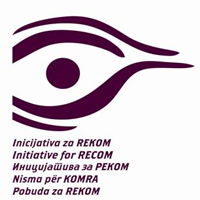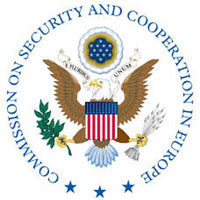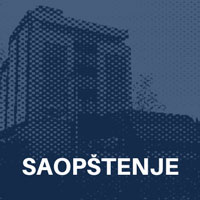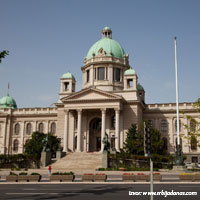


 On January 27, 2018, in Sarajevo, the Coalition for RECOM held the VIII Assembly Session, and afterwards, on January 28 and 29, 2018, the Eleventh Forum for Transitional Justice in post-Yugoslav Countries.
On January 27, 2018, in Sarajevo, the Coalition for RECOM held the VIII Assembly Session, and afterwards, on January 28 and 29, 2018, the Eleventh Forum for Transitional Justice in post-Yugoslav Countries.
The Assembly Delegates welcomed the willingness of most leaders of the post-Yugoslav countries to sign the Agreement on the Establishment of RECOM within the framework of the Berlin Process, at the upcoming London Summit in July 2018, thus activating Article 49 of the Draft Statute of RECOM on undertaking preparations for the establishment of the Commission (RECOM).

 Helsinki Commission Chairman Sen. Roger Wicker (MS) and Rep. Eliot Engel (NY-16), the Ranking Member of the House Committee on Foreign Affairs, today nominated Nataša Kandić and the Humanitarian Law Center for the 2018 Nobel Peace Prize.
Helsinki Commission Chairman Sen. Roger Wicker (MS) and Rep. Eliot Engel (NY-16), the Ranking Member of the House Committee on Foreign Affairs, today nominated Nataša Kandić and the Humanitarian Law Center for the 2018 Nobel Peace Prize.
Ms. Kandić founded the Humanitarian Law Center (Fond za humanitarno pravo) in Belgrade in 1992 to document egregious human rights violations committed during the conflicts associated with the breakup of the former Yugoslavia. More than 25 years later, the Humanitarian Law Center continues to fight for justice for victims of war crimes and to battle the extreme nationalism and strained ethnic tensions that linger in the Western Balkans.
The full text of the nomination letter to the Norwegian Nobel Committee can be found below:

 On January 29, 2018, the Humanitarian Law Center (HLC) filed a criminal complaint with the Office of the War Crimes Prosecutor (OWCP) against several unidentified members of the Secretariat of the Interior (SUP) of Beli Manastir, for the rape of six Roma women (including one pregnant woman and three minors) in the basement of the SUP Beli Manastir, in the summer of 1993.
On January 29, 2018, the Humanitarian Law Center (HLC) filed a criminal complaint with the Office of the War Crimes Prosecutor (OWCP) against several unidentified members of the Secretariat of the Interior (SUP) of Beli Manastir, for the rape of six Roma women (including one pregnant woman and three minors) in the basement of the SUP Beli Manastir, in the summer of 1993.

 After 14 years, the first war crimes case before specialized court councils in Serbia came to a close with the new final judgment for the crime at Ovčara near Vukovar. The Humanitarian Law Center (HLC) points out that the trial in this case is one of the best indicators of the ineptitude of Serbian institutions in dealing with the obligation to approach the crimes from the past with responsibility and dedication.
After 14 years, the first war crimes case before specialized court councils in Serbia came to a close with the new final judgment for the crime at Ovčara near Vukovar. The Humanitarian Law Center (HLC) points out that the trial in this case is one of the best indicators of the ineptitude of Serbian institutions in dealing with the obligation to approach the crimes from the past with responsibility and dedication.

 In anticipation of the closing of the ICTY, there has been plenty of discussion, including at EJIL: Talk! (see here), on the court’s impact in the former Yugoslavia, particularly relating to the public’s acceptance of ICTY findings and reconciliation. I’d like to contribute to this discussion with findings from the most recent public opinion survey conducted in Serbia – published in December 2017 (“Awareness of citizens of Serbia about the wars of the ‘90s, war crimes and war crimes trials” designed by the Humanitarian Law Center, commissioned by the Serbian daily Danas and conducted by Demostat – available only in Serbian here).
In anticipation of the closing of the ICTY, there has been plenty of discussion, including at EJIL: Talk! (see here), on the court’s impact in the former Yugoslavia, particularly relating to the public’s acceptance of ICTY findings and reconciliation. I’d like to contribute to this discussion with findings from the most recent public opinion survey conducted in Serbia – published in December 2017 (“Awareness of citizens of Serbia about the wars of the ‘90s, war crimes and war crimes trials” designed by the Humanitarian Law Center, commissioned by the Serbian daily Danas and conducted by Demostat – available only in Serbian here).
The latest survey mostly confirms what we already know from those previously conducted – revisionism and denialism are prevalent, and ethnic bias is entrenched – but it also provides additional information about these phenomena.

Sorry, this entry is only available in srpski.

Two former Yugoslav Army officers from the 549th Brigade told a court in Belgrade that they knew nothing about the attack on the village of Trnje in Kosovo in March 1999, when 27 Albanians were killed.


Speaking on N1 TV station in January 2018, Milovan Drecun, the President of the Serbian Parliamentary Committee for Kosovo and Metohija, referred to the Bytyqi brothers, killed by the Serbian police in July 1999, as „terrorists“. The Humanitarian Law Center (HLC) considers such a description of these victims, whose family has been waiting for justice for more than 18 years, unacceptable, especially bearing in mind that it comes from a person highly placeed within the power structures of the Republic of Serbia.